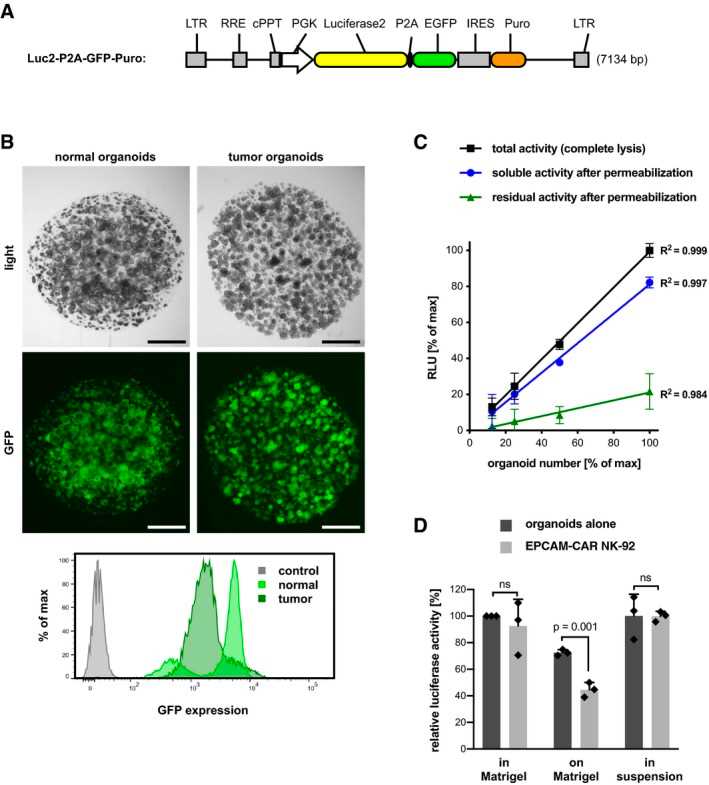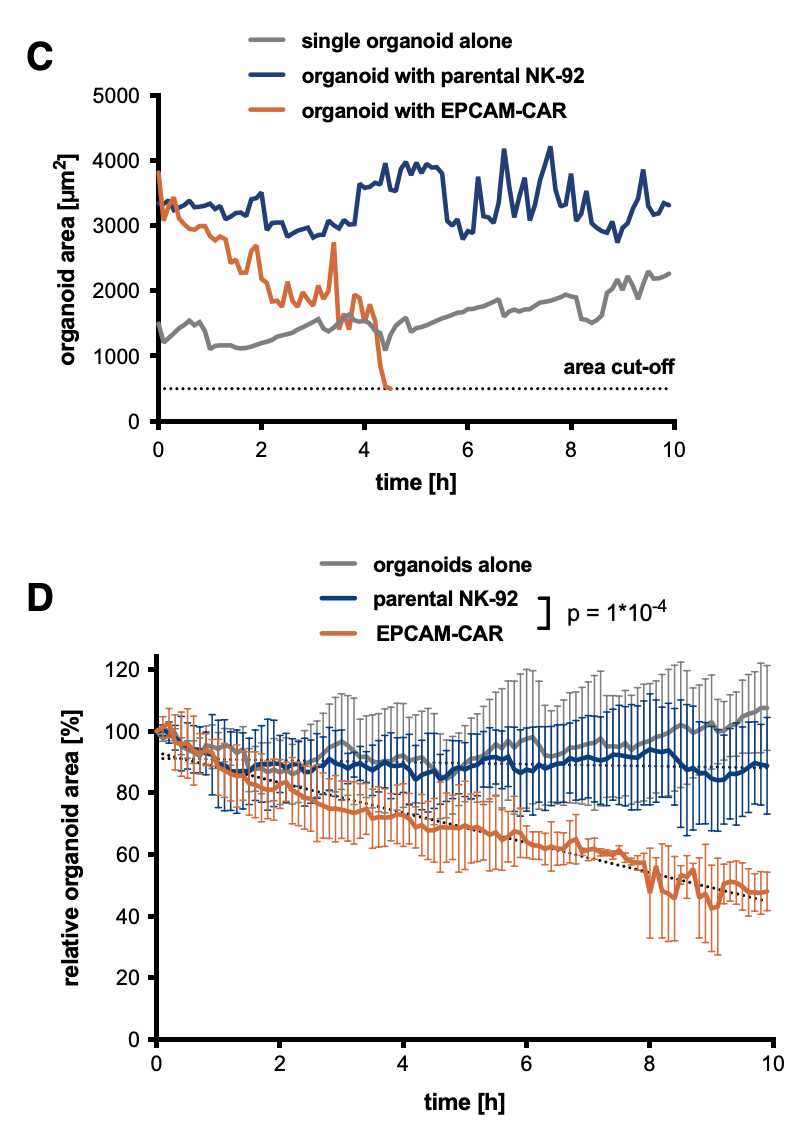Colorectal cancer is one of the most common lethal diseases of cancer. To develop potential CAR-cell-based immunotherapy for colorectal cancer treatment to overcome defects of traditional clinical options, models that resemble the tumor tissue physiological characteristics and microenvironment is necessary to test the efficacy of immune cell-based therapies. Creative Biolabs provides a biobank of colorectal cancer organoids that retain the genetics and function diversity of various colorectal carcinoma types to test colorectal targeted CAR-T cells efficacy in vitro.
 Fig.1 Scheme of a colon crypt and colon organoids. (Barbáchano, et al., 2021)
Fig.1 Scheme of a colon crypt and colon organoids. (Barbáchano, et al., 2021)
| Patient-derived Colorectal Cancer Organoid |
|
| Primary Mouse Colon Tumors Organoid |
|
| CRISPR/Cas9 Edited Human Colorectal Cancer Organoid |
|
 Fig.2 Characterizing organoids using various methods. (Creative Biolabs)
Fig.2 Characterizing organoids using various methods. (Creative Biolabs)
 Fig.3 Highlight features of our colon cancer organoid model. (Creative Biolabs)
Fig.3 Highlight features of our colon cancer organoid model. (Creative Biolabs)
Creative Biolabs provides the following antigen-targeted CAR-T products for anti-tumor efficacy test using cancer organoid models.
| Target Antigen | Target Description | CAR-T Products |
| CEA | CEA is a antigen marker of colorectal cancer, and is overexpressed in nearly 80% of diagnosed patients. | Anti-CEA CAR-T |
| EpCAM | Epithelial cell adhesion molecule (EpCAM) is expressed in kinds of human cancers, especially in metastatic stage of cancers. | Anti-EpCAM CAR-T |
| NKG2D | Instead of protection function, overexpression of NKG2D in colorectal cancer is related to poor survival of patients and can be targeted by CAR-T cells. | Anti-NKG2D CAR-T |
| GUCY2C | Guanylyl cyclase C (GUCY2C) is a membrane-bound receptor maintains in >95% of colorectal cancer metastases, and it is ectopically expressed in tumors that evolve from intestinal metaplasia, including esophageal, gastric, and pancreatic cancers. | Anti-GUCY2C CAR-T |
| CD46 | CD46 is a membrane protein that overexpressed in multiple human cancers, including prostate cancer, colon cancer, breast cancer, ovarian cancers, and hepatocellular carcinomas. | Anti-CD46 CAR-T |
| TAG72 | Tumor associated glycoprotein 72 (TAG-72) is an oncofetal mucin overexpressed in multiple human cancer cells, such as colon, breast, pancreas, and stomach. | Anti-TAG72 CAR-T |
| CAR-T Related Products | CAR-T Development Services |
| Applying Patient-Derived Colorectal Cancer Organoids to CAR-NK Cell Efficacy Test | |
|
Target: Normal and tumor organoids of colon derived from the patient are transduced with lentivirus containing the luciferase gene Effector cell: EPCAM NK Cell Co-culture: CAR-NK cells and organoids co-cultured on Matrigel Cytotoxicity assay: Detect luciferase activity retained in cells |
|
 Fig.4 Measure the luciferase activity in organoids to determine CAR-NK92 cell cytotoxicity. (Schnalzger, et al., 2019) |
 Fig.5 Image analysis of the single organoid area and total organoid area at continuous time points while co-culturing. (Schnalzger, et al. 2019) |
Creative Biolabs is committed to offering advanced organoids technology for cancer research and investigation of tumor responses to CAR-T therapies. Please contact us and find out how we can help you.
References
For any technical issues or product/service related questions, please leave your information below. Our team will contact you soon.
All products and services are For Research Use Only and CANNOT be used in the treatment or diagnosis of disease.
 NEWSLETTER
NEWSLETTER
The latest newsletter to introduce the latest breaking information, our site updates, field and other scientific news, important events, and insights from industry leaders
LEARN MORE NEWSLETTER NEW SOLUTION
NEW SOLUTION
CellRapeutics™ In Vivo Cell Engineering: One-stop in vivo T/B/NK cell and macrophage engineering services covering vectors construction to function verification.
LEARN MORE SOLUTION NOVEL TECHNOLOGY
NOVEL TECHNOLOGY
Silence™ CAR-T Cell: A novel platform to enhance CAR-T cell immunotherapy by combining RNAi technology to suppress genes that may impede CAR functionality.
LEARN MORE NOVEL TECHNOLOGY NEW SOLUTION
NEW SOLUTION
Canine CAR-T Therapy Development: From early target discovery, CAR design and construction, cell culture, and transfection, to in vitro and in vivo function validation.
LEARN MORE SOLUTION